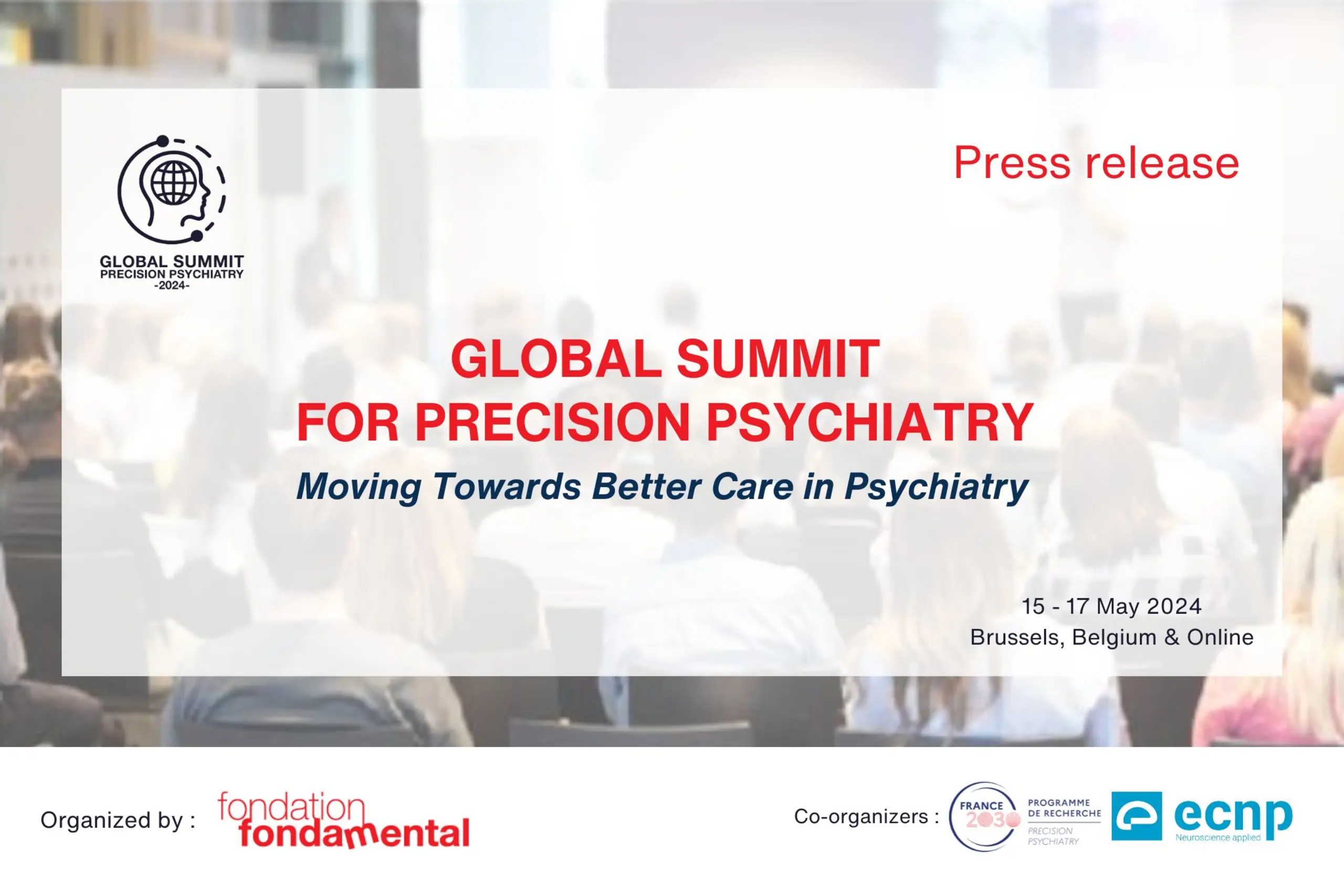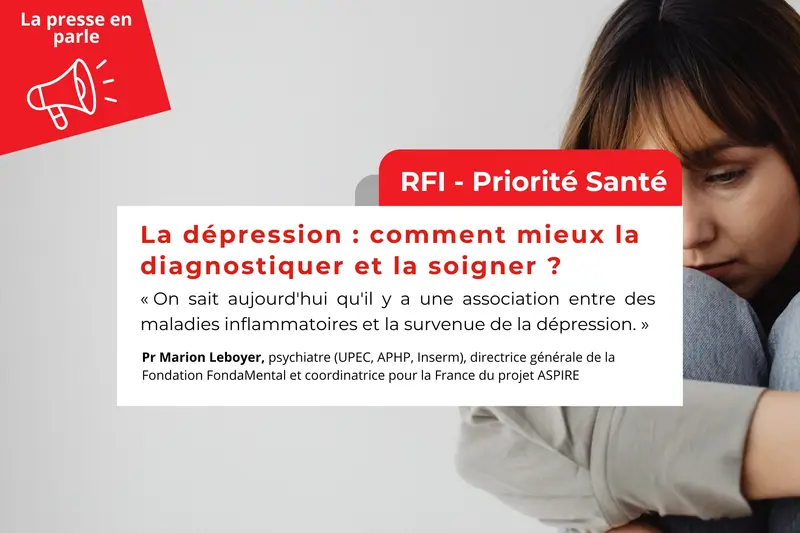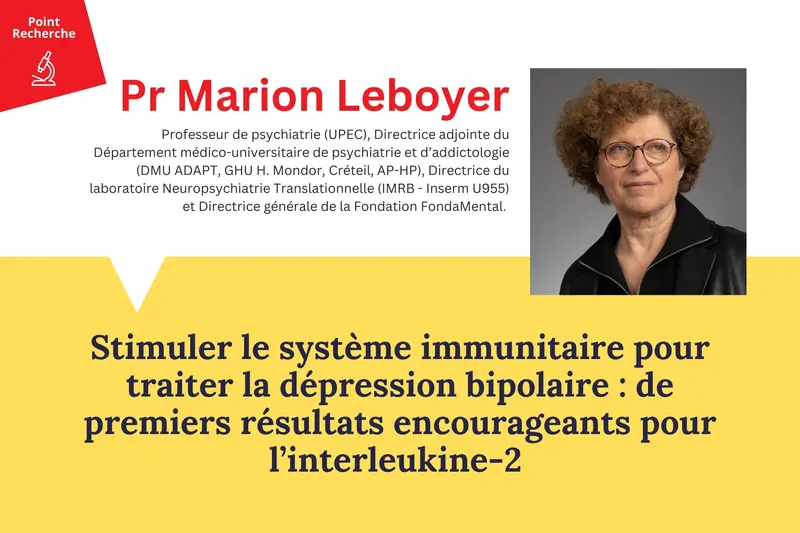
REPLAY | An international summit to share perspectives on precision psychiatry
From May 15 to 17, 2024, the 2nd World Summit of Precision Psychiatry took place in Brussels. For this event, the FondaMental Foundation, in collaboration with the PEPR PROPSY (Programme-Project in Precision Psychiatry, France 2030) and ECNP (the European College of Neuropsychopharmacology), is proud to have brought together leading international experts in the field, stakeholders in industry, regulatory and funding agencies, journalists, patient and caregiver associations, policymakers, decision-makers and international associations.
PRESS CONFERENCE | REPLAY
A solid basis for precision psychiatry
Brain diseases, both psychiatric and neurological, are complex, resulting from interactions between genetic and environmental factors. This complexity results in a large clinical and etiological heterogeneity between patients who suffer from the same diagnostic category (depressions, psychosis…), making it difficult to develop precise therapeutic innovations. «To meet these challenges,» says Marion Leboyer, Executive Director of the FondaMental Foundation, «a more personalized approach is needed, taking into account the underlying biological mechanisms and their evolution over time.»
«This involves gathering and analyzing large amounts of clinical, biological, digital and environmental data,» says Andrew Miller, professor of psychiatry at Emory University (USA), «but also rethinking clinical trials by testing the efficacy of therapeutic strategies targeting specific biological mechanisms and offered to homogeneous groups of patients whose diagnosis has been enriched with blood, brain or digital markers.»
Personalized treatment for each patient thanks to progresses in research
Recent advances in the fields of e.g., brain imaging, genomics, metabolomics, digital phenotyping, have made it possible to identify several neurobiological mechanisms underlying psychiatric disorders. During this conference, Martien Kas, president of ECNP and professor at the University of Groningen, highlighted “social withdrawal” as a common domain of several disorders such as depression, schizophrenia and Alzheimer’s disease, and underpinned by precise biological mechanisms. According to him, «this new cross-cutting approach will have a significant impact on the diagnosis and treatment of brain disorders and should lead to rethinking existing diagnostic categories.”
Brenda Penninx, professor at the Department of Psychiatry at Amsterdam MC and the Vrije Universiteit, presented major advances in the identification and treatment of immune and metabolic system dysfunctions associated with psychiatric disorders. She emphasizes «the importance of early and effective management of somatic comorbidities to improve patients› prognosis and quality of life.»
Together, towards precision psychiatry on an international scale
It is worth noting the presence of American scientists, including the new chairman of the DSM-6 (Diagnostic and Statistical Manual of Mental Disorders) Nitin Gotlay. At the summit, Bruce Cuthbert, Director of RDoC (Research Domain Criteria), pointed out that “diagnostic systems are evolving towards precision psychiatry, confronting the challenges inherent in the evaluation of any therapy and paving the way towards more precise and personalized interventions.”
The summit was also marked by the presence of several representative of the European Commission, including Andrzej Rys, Chief Scientific Advisor at DG SANTE, and Florence Butlen-Ducuing of the European Medicines Agency (EMA), underlining the growing importance given to mental health at the European level. As part of the European Commission’s ‹Comprehensive Approach to Mental Health› programme launched last year, the summit paves the way for innovative approaches to research and regulation in the field of psychiatry.
Today, the main challenge of mental illnesses lies in their insufficiently precise diagnosis and treatment, despite their colossal economic impact (4% of GDP) and their major impact on patients› quality of life. Like the advances made in precision medicine in recent years in the fields of cardiovascular disease and cancer, the search for objective markers of diagnosis and the development of targeted therapeutic strategies offers real hope for the nearly 800 million people worldwide living with a psychiatric disorder (or just over 10% of the world’s population, according to the OECD), and for their loved ones.
About PEPR PROPSY
The Project-Program in Precision Psychiatry, selected in 2022 as part of the France 2030 calls, is led by Inserm and CNRS, and directed by Professor Marion Leboyer. It aims to deploy precision psychiatry for mood disorders, psychotic disorders and autism spectrum disorders. Its main challenges are to discover prognostic and stratification biomarkers through the construction of a very large cohort of 10,000 patients comprehensively evaluated, to better understand the underlying biological mechanisms, to develop targeted therapeutic strategies, to create a new biomedical pathway for mental health and psychiatric illnesses and to deploy training and information actions in order to raise awareness among civil society and increase the attractiveness of the discipline.
About ECNP
ECNP is Europe’s leading independent forum for the science of CNS treatments. The ECNP Congress showcases the world’s best disease-oriented brain research, annually attracting about 6,500 psychiatrists, neuroscientists, neurologists and psychologists. ECNP’s wide range of scientific and educational activities, programmes and events make it the largest non-institutional supporter of applied and translational neuroscience research and education in Europe.
• Press contact : Tom Parkhill, tom@parkhill.it
About the participants
• Marion Leboyer, MD, PhD, is a psychiatrist professor at the University Paris-Est Créteil (UPEC), and head of the University Hospital Federation of Precision Medicine in Psychiatry and Addictology (FHU ADAPT, AP-HP). She is also the director of the Inserm Translational Neuro-psychiatry laboratory and of the FondaMental Foundation, and scientific director of PEPR PROPSY (the Precision Psychiatry Project Program), selected as part of the France 2030. Author or co-author of more than 1,000 international articles, she conducts research on the genetic and environmental vulnerability factors of major mental disorders, particularly in bipolar disorder, schizophrenia and autism, and on immune-psychiatry.
• Andrew H. Miller, MD, is professor and associate dean for Research in the Department of Psychiatry and Behavioral Sciences at Emory University School of Medicine in Atlanta, USA. He is also responsible for Emory’s behavioural immunology programme. Dr Miller is an internationally recognized expert in research on brain-immune system interactions in depressive disorders.
• Marteen Kas, PhD, is professor of behavioural neuroscience at the Groningen Institute for Evolutionary Life Sciences in the Netherlands. His research focuses on the determinants of behaviour, particularly behavioural strategies and biological processes that are essential in all species and are affected by various neuropsychiatric disorders (e.g., social interaction and sensory information processing). In addition, he is president of the European College of Neuropsychopharmacology (ECNP), a member of the editorial board of Mammalian Genome and co-ordinator of the PRISM1 and PRISM2 projects, two major EU Innovative Medicine Initiative (IMI) projects that aim to elucidate the biological factors underlying social dysfunction, which is an early symptom common to schizophrenia, Alzheimer’s disease and major depressive disorder.
• Brenda Penninx, PhD, is professor and chair of the Department of Psychiatry at UMC Amsterdam and a world leader in mental health research. Since 2004, she has led the multi-site Netherlands Study of Depression and Anxiety (NESDA), a longitudinal study on the course and consequences of depressive and anxiety disorders. She is widely recognized for her interdisciplinary approach to mental health research, which integrates psychiatry, psychology, neuroimaging, genomics, psychoneuroendocrinology, sociology, and behavioural medicine.
Press contact
Mathilde Couderc – mathilde.couderc@agence-constance.fr – 07 57 68 30 62


